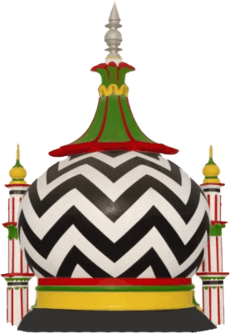Sunni Tehreek
Pakistan Sunni Tehreek is a Pakistani Barelvi Religious, Welfare and Political organization. The organization was founded by Muhammad Saleem Qadri Shaheed in Pakistan in 1990 to protect the Mosques of Sunni Muslims of Barelvi school of thought, which is followed by a vast majority in Pakistan.[1][2]
History
After the fragmenting and decline of the Muttahida Qaumi Movement, Pakistan Sunni Tehreek arose as the primary opposition to the Deobandi Banuri Mosque, headed by Nizamuddin Shamzai. The Pakistan Sunni Tehreek strongly opposed the giving of important religious posts to Deobandis. Its branch in Lahore publicly declared its opposition to the appointment of a Deobandi cleric as khateeb of Badshahi Mosque, and other similar appointments.[3]
Controversies
In May 2001, sectarian riots broke out after Sunni Tehreek leader Saleem Qadri was assassinated by Sipah-e-Sahaba Pakistan, an anti-Shiite Deobandi militant group. His successor, Abbas Qadri, charged President Pervez Musharraf's regime with "patronising terrorists" and "standing between us and the murderers."[4]
In April 2007, according to some sources, Sunni Tehreek members opened gunfire on an Ahl al-Hadith Mosque in Karachi. One worshiper was killed in the attack.[5] After the attack, Western analysts described the movement as a radicalization of traditional beliefs in the Indian subcontinent.[6]
References
- ↑ http://pakistanherald.com/Profile/Muhammad-Ejaz-Sarwat-Qadri-804
- ↑ "Karachi suicide blasts have Al-Qaida links". The Times of India. Archived from the original on March 2, 2009. Retrieved 2008-04-13.
- ↑ [sacw] SACW Dispatch | 9 Sept. 00
- ↑ South Asia Monitor >
- ↑ Staff report (11 April 2007). "One dead as ST tries to take control of Ahle Hadith mosque". Daily Times. Retrieved 2 December 2011.
- ↑ Olivier Roy and Antoine Sfeir, The Columbia World Dictionary of Islamism, pg. 275. Columbia University Press, 2007.
